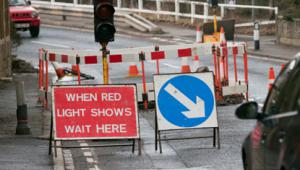By Richard Johnstone
20 April 2011
Peter Box, chair of the LGA’s economy and transport board, said that the resulting expensive repairs added to the £10.5bn backlog councils already face in road maintenance.
The LGA is calling for councils to be able to issue permits for roadworks to ensure they are timed to cause the minimum disruption to motorists. Councils currently need central government approval for such a permit scheme and only two are in operation – in London and Kent.
Box also called for utility companies to pay a bond or deposit in advance of roadworks to make it easier for councils to recoup the cost of any damage caused.
He said: ‘It is only right that companies which drill and dig up our roads pay their fair share towards fixing the damage. Local authorities should be able to hold these firms to account and ensure that any routine maintenance work is co-ordinated. This will mean fewer holes in the roads and fewer unnecessary delays for motorists.’
The National Joint Utilities Group represents utilities on street works issues. Responding to the report, chief executive Les Guest said the group believed that ‘better co-operation between local authorities and utilities, and better understanding on why repairs to the road surface fail, will help save money and avoid disruption’.
He added: ‘The Department for Transport has revised guidelines for repairing road surfaces and utilities are already introducing tighter controls and providing new training to produce a better standard.’
The Highways Term Maintenance Association, comprising contractors who undertake roadwork for utilities companies, said that councils already had the powers to take action when works were not completed within a reasonable period.
A spokesman said that powers contained in the 1991 New Roads and Street Works Act meant there was ‘no reason why the utility companies should not be held to account over their reinstatement works’.
20 April 2011
Councils are being passed a repair bill totalling £70m every year due to utility companies failing to fix roads after they have been dug up, a report has found.
According to the Local Government Association, 2 million holes were dug in English and Welsh roads last year, of which some 360,000 were not completed to the agreed specification. Work either ran late or roads were not restored to their original condition.Peter Box, chair of the LGA’s economy and transport board, said that the resulting expensive repairs added to the £10.5bn backlog councils already face in road maintenance.
The LGA is calling for councils to be able to issue permits for roadworks to ensure they are timed to cause the minimum disruption to motorists. Councils currently need central government approval for such a permit scheme and only two are in operation – in London and Kent.
Box also called for utility companies to pay a bond or deposit in advance of roadworks to make it easier for councils to recoup the cost of any damage caused.
He said: ‘It is only right that companies which drill and dig up our roads pay their fair share towards fixing the damage. Local authorities should be able to hold these firms to account and ensure that any routine maintenance work is co-ordinated. This will mean fewer holes in the roads and fewer unnecessary delays for motorists.’
The National Joint Utilities Group represents utilities on street works issues. Responding to the report, chief executive Les Guest said the group believed that ‘better co-operation between local authorities and utilities, and better understanding on why repairs to the road surface fail, will help save money and avoid disruption’.
He added: ‘The Department for Transport has revised guidelines for repairing road surfaces and utilities are already introducing tighter controls and providing new training to produce a better standard.’
The Highways Term Maintenance Association, comprising contractors who undertake roadwork for utilities companies, said that councils already had the powers to take action when works were not completed within a reasonable period.
A spokesman said that powers contained in the 1991 New Roads and Street Works Act meant there was ‘no reason why the utility companies should not be held to account over their reinstatement works’.




















